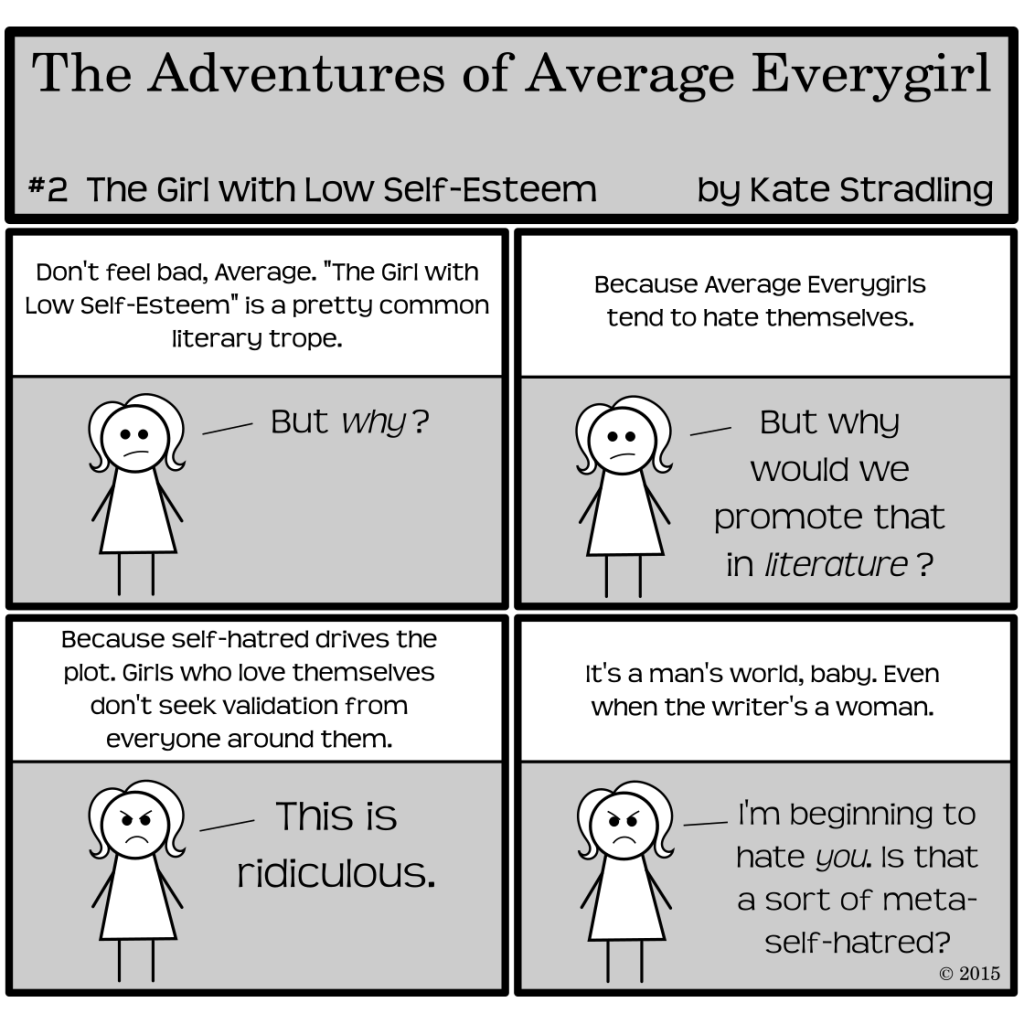
“Girls who love themselves don’t seek validation from everyone around them.”
I’ve pondered this statement long before I ever wrote it into this little strip. It’s nice to receive validation. Any author can expound upon the delight she derives from a well-worded review or a note of encouragement. Any marketing strategy is, essentially, a search for validation, too. “See? My product is worth something. People are buying it.”
I’m not skewering the practice itself, but external validation, while delightful, can never remedy low self-esteem. A heroine does not suddenly have worth because she saves the world, or because a man falls slobbering in love with her, or because she is raised from poverty to nobility. So why is this motif so enduring?
“I’m worth something because I scored the game-winning shot.”
“I’m worth something because my crush confessed his love for me.”
“I’m worth something because I was crowned prom queen.”
Dear world,
You can stop after the first three words. There is no “because.”
Sincerely,
Kate
More than simply validation
“The Girl with Low Self-Esteem” fits into the broader Girl-as-Object spectrum. When a character is acted upon rather than acting for herself, when she laments her inferiority and pines for someone else to improve her world, someone to love her, someone to praise her, she’s reinforcing this stereotype. When an author writes a character into this submissive state of mind as though it’s a positive with positive consequences, that author is reinforcing the stereotype.
I’m not calling for an outright ban on characters with low self-esteem, but if the endgame for that character doesn’t involve the acquisition of some dignity and confidence independent of external approval, maybe rethink the low-self-esteem angle. It’s not romantic for a girl to go catatonic when her boyfriend dumps her. It’s mental, and she needs therapy. Let’s not portray it otherwise, mm’kay?
We’re worth something. All of us, each as individuals. That knowledge doesn’t come from others. It comes from God. It is Eternal Truth. It is non-negotiable, and wallowing in self-pity or self-hatred will atrophy a soul, not open a door to new love or adventure.
The End.
(For now.)
I think that’s what I love so much about Fanny Price. She ‘esteems others more highly than herself’ but she doesn’t depend on their goodwill for her happiness. In fact, she stands up for what she knows to be right, even (especially) when the people she love are doing the wrong thing. She feels the pain of their disapproval but doesn’t falter. Her strength is in herself….which is why I’m always irritated to hear modern readers dismiss her as weak and useless and irritating.
Heck, she goes through life knowing that she’ll probably never marry the man she loves, and she goes on being the same quiet little Fanny Price, helping people and being kind and doing the right thing. She’s such a darling.
THANK YOU! I was flabbergasted when I learned that some critics consider Mansfield Park to be the weakest of Austen’s novels, because I had always loved it. I remember applauding Fanny when she first rejected Henry Crawford’s advances, and then as the novel continued, having my defenses against him crumble while hers remained stalwart. Part of me was rooting for him up until he finally cracked and went haring off with the cousin, at which point I was so grateful, so ridiculously grateful, for Fanny’s solid determination to resist. I had wavered as a reader, but as a character, she had not.
There must be a different pattern at play with the classics, though. Fanny “esteems others more highly than herself,” but yet she doesn’t have low self-esteem. If she did, at least by the modern pattern, the story would have ended with a match between her and Crawford. Instead, she’s true to herself, even in the face of dire consequences. You are perfectly correct: she is a darling.
I had the EXACT same experience with Crawford! He was just so charming and so almost sincere, and he actually valued something really beautiful when he valued Fanny. But then he ruined it all, and though I felt sorry, I could see that if temporary rejection set him back he was of no value at all.
Also, it helps that someone described the film Crawford as a bipedal mouse, and it’s hard to feel meltingly about a bipedal mouse 😀
Yes, that does put a wrench in the works, doesn’t it. 😀
Comments are closed.